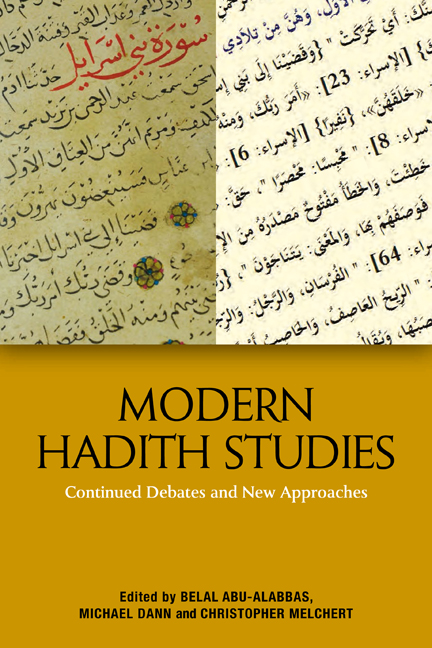Book contents
- Frontmatter
- Contents
- Figures and Tables
- Acknowledgements
- Note on Conventions
- Notes on Contributors
- Introduction
- 1 Kunnā nakrahu al-kitāb: Scripture, Transmission of Knowledge, and Politics in the Second Century AH (719–816 ce)
- 2 The History of the Adhān: a View from the Hadith Literature
- 3 Ibn al-Mubārak, Traditionist
- 4 Early ‘Traditionist Sufis’: A Network Analysis
- 5 The Common Link and its Relation to Hadith Terminology
- 6 Hadith Criticism between Traditionists and Jurisprudents
- 7 Hadith Criticism in the Levant in the Twentieth Century: From ẓāhir al-isnād to ʿilal al-ḥadīth
- 8 The Reception and Representation of Western Hadith Studies in Turkish Academe
- 9 Can Different Questions Yield the Same Answers? Islamic and Western Scholarship on Shiʿi Narrators in the Sunni Tradition
- Index
9 - Can Different Questions Yield the Same Answers? Islamic and Western Scholarship on Shiʿi Narrators in the Sunni Tradition
Published online by Cambridge University Press: 01 October 2020
- Frontmatter
- Contents
- Figures and Tables
- Acknowledgements
- Note on Conventions
- Notes on Contributors
- Introduction
- 1 Kunnā nakrahu al-kitāb: Scripture, Transmission of Knowledge, and Politics in the Second Century AH (719–816 ce)
- 2 The History of the Adhān: a View from the Hadith Literature
- 3 Ibn al-Mubārak, Traditionist
- 4 Early ‘Traditionist Sufis’: A Network Analysis
- 5 The Common Link and its Relation to Hadith Terminology
- 6 Hadith Criticism between Traditionists and Jurisprudents
- 7 Hadith Criticism in the Levant in the Twentieth Century: From ẓāhir al-isnād to ʿilal al-ḥadīth
- 8 The Reception and Representation of Western Hadith Studies in Turkish Academe
- 9 Can Different Questions Yield the Same Answers? Islamic and Western Scholarship on Shiʿi Narrators in the Sunni Tradition
- Index
Summary
In the second/eighth and third/ninth centuries, roughly two hundred narrators labelled as Shiʿis were active in the milieux that gave rise to the Sunni hadith tradition. Abū ʿAbd al-Raḥmān al-Nasāʾī (d. 303/915), the compiler of the last of six hadith collections recognised as canonical by Sunnis, was himself associated with Shiʿi sentiments and likely lost his life as a result. These Shiʿi narrators existed along a broad spectrum of theological and political orientations, but collectively embodied the high degree of sectarian ambiguity that characterised Islam's early centuries. Some of them played an important role in the development of nascent Shiʿi sectarian identities, others were best known for their support of Shiʿi-inspired rebellions against the Umayyad and ʿAbbāsid dynasties, and yet others were at the forefront of the proto-Sunni milieu of the Iraqi garrison city of Kufa. What they shared in common was simply their participation in proto-Sunni traditionist circles and an association with some iteration of early Shiʿism, a retrospectively ironic fact that has rendered them a perennial object of curiosity for subsequent generations of Sunni and Shiʿi scholars.
In modern scholarship, these narrators have received the historiographical attention of historians working in the Western tradition of Islamic Studies, as well as that of Arab, Persian and Turkish scholars writing in a more or less confessional fashion. To date, the volume of work produced in non- Western languages significantly exceeds that of work produced in Western languages. This non-Western, or Islamic, scholarship can be further subdivided into works by Imāmī Shiʿis, pro-ʿAlid Sunnis and Sunnis working in confessional academic settings. by both Shiʿis and Sunnis significantly advances our knowledge of the place of Shiʿi narrators in the Sunni hadith tradition, even though it is often aimed at addressing normative questions of orthodoxy and sectarian boundaries foreign to the Western tradition of Islamic Studies.
In what follows, I offer a summary of the Western scholarship and an analysis of the contemporary Islamic scholarship on this topic, focusing on the historiographical contributions made by the latter as seen from the standpoint of the former.
- Type
- Chapter
- Information
- Modern Hadith StudiesContinuing Debates and New Approaches, pp. 192 - 214Publisher: Edinburgh University PressPrint publication year: 2020



